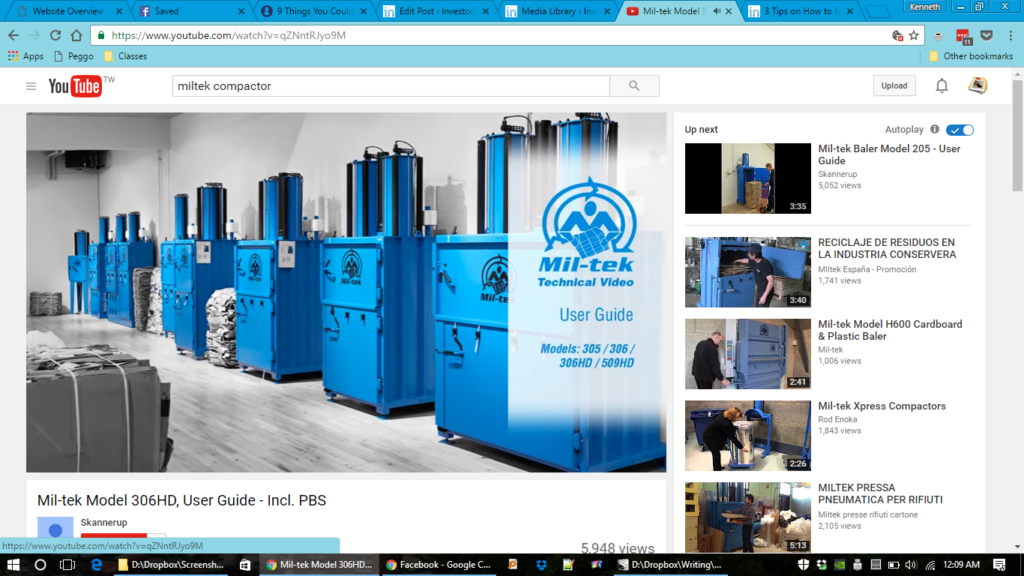 In our business, one of our waste outputs is paper and cardboard from our handouts, from used writing books, etc.. It’s amazing how much we generate each week, and it’s bulky but not particularly heavy, so storage is a real problem. If I didn’t have a decent waste collection service, storage would quickly become a problem, and a trash compactor would be essential…
In our business, one of our waste outputs is paper and cardboard from our handouts, from used writing books, etc.. It’s amazing how much we generate each week, and it’s bulky but not particularly heavy, so storage is a real problem. If I didn’t have a decent waste collection service, storage would quickly become a problem, and a trash compactor would be essential…
I’m lucky that our waste collection service is so effective, otherwise I’d be looking at buying a trash compactor. It’s a major expense, for sure. As a small entrepreneur, I’d be looking at making it affordable by doing my homework properly:
Research trash compactor manufacturers for after sales care
Make a list of as many compactor manufacturers as you can find. You can start with Google, and use the keywords “Compactor Manufacturer“. However, you should not make the mistake of assuming that all of these companies make products that are basically the same quality. That is not the case. There can be quite a big difference in the way that these machines perform from one manufacturer to another.
So you will need to look at reviews of some of the machines you find to determine which are better manufacturers/models. If you find a model/manufacturer you like, then check out reviews and feedback from others who have purchased their products. Don’t blindly follow the reviews, after all reviews can easily be faked.
Look for genuine complaints with specific issues that are discussed, you’ll find insight in the 2-, 3-, and 4-star reviews especially. You’ll get a lot of insight into the products, what they can really do, and how they perform in real world situations.
You should then find out which compactors manufacturers have the best reputations for reliability, warranties, and repairability. Ideally, you want to buy a trash compactor that does not need to be repaired on a regular basis.
If repairing is necessary, what kind of service does the particular manufacturer provide? For example, the trash compactors produced by Miltek Australia have a reputation for being very dependable machines.
Try before you buy: Check out the demos and get a hands-on test-drive
It is always a good idea to see a piece of machinery operate with your own eyes before you plunk down a large amount of cash. This is why you should make arrangements to test out compactors that are made by a variety of companies. Seeing these machines work with your own eyes will allow you to make an educated purchase.
Make sure to ask how you can view the machine in operation, whether they have a demo or can provide a trip to an installed machine with a satisfied owner. When you’re talking to the representatives, keep a list of notes of the issues you want to raise so you won’t forget anything important. It’s easy to skip over a crucial item if you’re short of time or being offered a time-sensitive deal.
Get your calculators ready: 3 – 2 – 1 Count!
All costs should be calculated; not just the purchase price. The most obvious is state and national taxes that will be added to the bill. However, you will also need to consider delivery charges, installation costs, usage costs, repair costs, and training costs.
You will probably not be installing your own trash compactor. Therefore, you will need to find a company to do it for you. Call all of the companies in your area that can perform this task for you. Get estimates from all of them to find out which one offers the lowest price.
Of course, time is money. So if you can get an all-inclusive package that covers maintenance & repair as well, it may well save on the downtime costs by helping you get assistance quickly. Downtime in any business can mean that orders get delayed, production is cancelled, and you have angry customers asking where their goods are, especially if you’re depending on compactors.
So do your due diligence, get your hands dirty, and finalize your costs before you signed on the dotted line. At least, you’ll have peace of mind that you covered the important issues in buying an important tool. If I didn’t know better, I’d say that’s as good as saving a few dollars upfront! And this advice pertains to buying almost any equipment for your small business, too!
